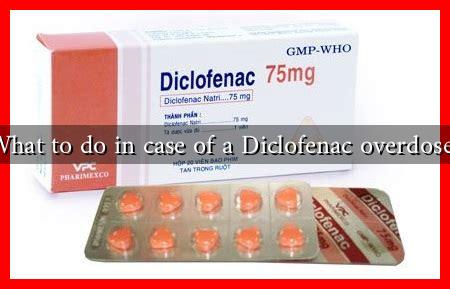-
Table of Contents
What to Do in Case of a Diclofenac Overdose?
Diclofenac is a non-steroidal anti-inflammatory drug (NSAID) commonly used to relieve pain, reduce inflammation, and lower fever. While it is effective for various conditions, including arthritis and acute pain, an overdose can lead to serious health complications. Understanding the steps to take in the event of a diclofenac overdose is crucial for ensuring safety and effective treatment.
Recognizing the Symptoms of Diclofenac Overdose
Before addressing what to do in case of an overdose, it is essential to recognize the symptoms. An overdose of diclofenac can manifest in various ways, and symptoms may vary based on the amount ingested and individual health factors. Common symptoms include:
- Nausea and vomiting
- Stomach pain
- Headaches
- Dizziness or lightheadedness
- Ringing in the ears (tinnitus)
- Confusion or altered mental state
- Severe allergic reactions (e.g., rash, itching, swelling)
- Kidney problems (e.g., decreased urination, swelling in legs)
In severe cases, an overdose can lead to gastrointestinal bleeding, liver damage, or even coma. If you suspect an overdose, it is vital to act quickly.
Immediate Steps to Take
If you or someone else is suspected of having overdosed on diclofenac, follow these immediate steps:
- Call Emergency Services: Dial your local emergency number or poison control center immediately. Provide them with all relevant information, including the amount of diclofenac taken and the time of ingestion.
- Do Not Induce Vomiting: Unless instructed by a medical professional, do not attempt to induce vomiting. This can lead to further complications.
- Gather Information: Collect any available information about the person’s medical history, current medications, and the specific diclofenac product taken (e.g., dosage, formulation).
- Stay Calm: Keeping a clear head can help you provide accurate information to emergency responders and assist the affected individual.
Medical Treatment for Diclofenac Overdose
Upon arrival at a medical facility, healthcare professionals will assess the situation and may perform several interventions, including:
- Activated Charcoal: If the overdose is recent, activated charcoal may be administered to absorb the drug and prevent further absorption into the bloodstream.
- Intravenous Fluids: To maintain hydration and support kidney function, IV fluids may be given.
- Monitoring Vital Signs: Continuous monitoring of heart rate, blood pressure, and respiratory function will be conducted to detect any complications early.
- Supportive Care: Treatment will focus on managing symptoms and complications, which may include medications to protect the stomach lining or address kidney issues.
Case Studies and Statistics
According to a study published in the Journal of Clinical Toxicology, diclofenac overdoses are relatively rare but can lead to significant morbidity. In one case study, a 45-year-old male ingested 600 mg of diclofenac, resulting in acute kidney injury and gastrointestinal bleeding. Prompt medical intervention was crucial in preventing long-term damage.
Statistics indicate that NSAID overdoses, including diclofenac, account for a notable percentage of emergency room visits related to medication toxicity. Awareness and education about the risks associated with these medications can help reduce the incidence of overdoses.
Preventing Diclofenac Overdose
Prevention is always better than cure. Here are some tips to avoid diclofenac overdose:
- Always follow the prescribed dosage and instructions provided by your healthcare provider.
- Keep medications out of reach of children and pets.
- Be cautious when combining diclofenac with other medications, especially other NSAIDs or blood thinners.
- Regularly review your medications with your healthcare provider to ensure safety and efficacy.
Conclusion
Diclofenac is a valuable medication for managing pain and inflammation, but an overdose can lead to serious health risks. Recognizing the symptoms, taking immediate action, and seeking medical help are critical steps in managing an overdose. By understanding the risks and implementing preventive measures, individuals can use diclofenac safely and effectively. Always consult with a healthcare professional if you have concerns about your medication or its potential side effects.

